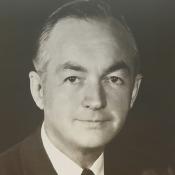Maurice Hubert Stans
 The son of John Hubert and Mathilda Nyssen Stans was born March 22, 1908, in Shakopee, Minnesota. His elementary education was at St. Mark's School, where he won highest school honors and was class valedictorian. He attended Shakopee High School, graduating as valedictorian in 1925.
The son of John Hubert and Mathilda Nyssen Stans was born March 22, 1908, in Shakopee, Minnesota. His elementary education was at St. Mark's School, where he won highest school honors and was class valedictorian. He attended Shakopee High School, graduating as valedictorian in 1925.
He attended evening classes at Northwestem University (1925-28) and later at Columbia University (1928-30) but he did not complete the requirements necessary for a degree. He has received honorary Doctor of Laws degrees from Illinois Wesleyan University (1954), Northwestern and DePaul Universities (1960), University of San Diego (1970), Pepperdine University (1984), and from the Colleges of Grove City (1969), St. Anselm (1969), Gustavus Adolphus (1970), Pomona (1971), and Maryville (1971). An honorary Doctor of Public Administration was bestowed upon him by Parsons College (1960), and an honorary Doctor of Public Service degree by Rio Grande College (1972). In 1979 he received an honorary Doctor of Humane Letters degree from National University. He was certified as a CPA in 1931 (New York and Ohio).
In 1925 he joined the Chicago firm of Harry Levi & Co. as a stenographer. He resigned in 1928 to join the accounting firm of Alexander Grant & Company. He became a partner in 1931, and executive partner in 1938, a position he held until 1955, at which time he resigned to become Deputy Postmaster General. Prior to appointment as Deputy Postmaster General, early in 1953, he served on a task force for six weeks to assist the U. S. House of Representatives Appropriations Committee in reviewing the Federal Budget for the fiscal year 1954. Upon completion of that assignment he was selected as a consultant to study and modernize postal fiscal systems and accounting practices for the Postmaster General, devoting approximately half of his time to this for two years. In 1957 he was appointed deputy director of the Bureau of the Budget, serving in that capacity for six months, after which time (March 1958) he was named director of the Bureau of the Budget, a position he held until 1961.
He served as president and director of Western Bancorporation, Los Angeles, and as vice chairman and a director of the United California Bank in 1961 and 1962. During this period, he also served as a director of several large California corporations, as a trustee of Pomona College, as chairman of a committee on economy and efficiency in Los Angeles County government, and as a member of a commission to revise the constitution of the State of California. He was also a syndicated columnist. In 1963 he became senior partner of William R. Staats & Company which merged with Glore Forgan, Inc. in 1965. He was elected president of the resulting investment banking firm of Glore Forgan, William R. Staats, Inc., and moved to New York. In 1968 he became chairman of the Nixon for President Committee, then chairman of the Nixon for President Finance Committee. In 1969 he became U. S. Secretary of Commerce, serving until 1972; he then resigned to become chairman of the Finance Committee to Re-elect the President and chairman of the Republican National Finance Committee.
Active in professional organizations, he served as president (1954-55) and vice president (1949-50) of the AICPA. He served as a member of the AICPA's Council and Executive Committee. He also was a member of many of its committees, including the Committees on Accounting Procedure (1943-48, 1953-54) and Terminology (1953-54). He was a director of the Illinois Society of CPAs (1944-46) and editor of that organization's periodical, The Illinois Certified Public Accountant. Other professional affiliations include AAA, AGA, NAA, District of Columbia Institute of CPAs, and the New York State, California, and Hawaii Societies of CPAs. He has written numerous articles for professional journals, and he was a contributing editor of the CPA Handbook, published by the AICPA in 1953. In 1978, he authored The Terrors of Justice: The Untold Side of Watergate. He was awarded the Alpha Kappa Psi Foundation Accounting Award (1952), the AICPA's Gold Medal Award (1954), the Tax Foundation Award (1959), the Great Living American Award of the Chamber of Commerce of the United States (1961), Salesman of the Year by the National Sales and Marketing Executives International (1971), and Free Enterprise Award of the International Franchise Association (1987).
In 1940 he founded the Stans Foundation in Chicago to assist organized charitable, religious, scientific, and educational institutions; he served as chairman and director of the Foundation. An active wildlife conservationist, he was a founder of the African Wildlife Foundation, and served as a trustee (1959-63). He was also a trustee of the Shikar-Safari International Foundation. He was the sponsor and major contributor to Stans African Hall, a natural history museum in Rock Hill, South Carolina, which he established in 1952.
He married Kathleen Carmody on September 7, 1933; they adopted four children. She died in October 1984. Maurice died on April 14, 1998 at age 90.
 The son of John Hubert and Mathilda Nyssen Stans was born March 22, 1908, in Shakopee, Minnesota. His elementary education was at St. Mark's School, where he won highest school honors and was class valedictorian. He attended Shakopee High School, graduating as valedictorian in 1925.
The son of John Hubert and Mathilda Nyssen Stans was born March 22, 1908, in Shakopee, Minnesota. His elementary education was at St. Mark's School, where he won highest school honors and was class valedictorian. He attended Shakopee High School, graduating as valedictorian in 1925.